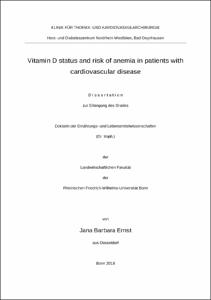Ernst, Jana Barbara: Vitamin D status and risk of anemia in patients with cardiovascular disease. - Bonn, 2018. - Dissertation, Rheinische Friedrich-Wilhelms-Universität Bonn.
Online-Ausgabe in bonndoc: https://nbn-resolving.org/urn:nbn:de:hbz:5n-49972
Online-Ausgabe in bonndoc: https://nbn-resolving.org/urn:nbn:de:hbz:5n-49972
@phdthesis{handle:20.500.11811/7340,
urn: https://nbn-resolving.org/urn:nbn:de:hbz:5n-49972,
author = {{Jana Barbara Ernst}},
title = {Vitamin D status and risk of anemia in patients with cardiovascular disease},
school = {Rheinische Friedrich-Wilhelms-Universität Bonn},
year = 2018,
month = mar,
note = {Vitamin D deficiency and anemia are prevalent in patients with cardiovascular disease (CVD), and both are independent risk factors for increased morbidity and mortality. Epidemiological studies suggest an inverse association between vitamin D status and anemia risk in several populations. Earlier non-randomized intervention studies reported an increase in hemoglobin (Hb) values by administration of vitamin D metabolites. However, adequately powered, randomized controlled trials (RCT) with vitamin D are still warranted to assess whether vitamin D has beneficial effects on anemia. If confirmed, vitamin D supplementation could be a promising preventive or therapeutic option to decrease the prevalence of vitamin D deficiency and anemia. Thus, the overall aim of this thesis was 1) to determine the associations between vitamin D metabolites and anemia in patients with CVD and 2) to determine if daily vitamin D supplementation can improve Hb levels and therefore anemia risk in CVD patients.
Two cross-sectional studies (CHAPTER ONE and CHAPTER TWO) showed significant independent inverse associations between the vitamin D metabolites 25-hydroxyvitamin D (25OHD) and 1,25-dihydroxyvitamin D (1,25[OH]2D) and anemia risk in cardiac surgical patients and patients referred for coronary angiography. In both studies, the association of anemia was stronger with low circulating 1,25(OH)2D levels (<40 pmol/l) than it was with deficient circulating 25OHD levels (<30 nmol/l). In two secondary analyses of RCTs the effects of a daily vitamin D3 supplement on Hb levels and anemia risk versus placebo were examined in hypertensive patients for eight weeks (2,800 IU daily; CHAPTER THREE) and in heart failure patients for 36 months (4,000 IU daily; CHAPTER FOUR). Both investigations indicate that a daily vitamin D supplement does not improve Hb values in patients with CVD. Comparable results were shown in the subgroups of patients with initial 25OHD levels <30 nmol/l and in patients with initial eGFR values <60 mL/min/1.73 m2. In hypertensive patients, vitamin D treatment did not influence anemic status significantly (7.5% baseline vs. 7.5% study termination), whereas in patients with heart failure anemia status significantly increased by 12.9% in the vitamin D group.
In conclusion, despite the promising results of the cross-sectional studies, this thesis argues against Hb-improving effects of vitamin D3 supplements that are of clinical relevance in patients with CVD. However, since 1,25(OH)2D concentrations show a stronger independent association with anemia risk than 25OHD levels and first interventional studies using 1,25(OH)2D administration showed promising results, future studies should explore the administration of active vitamin D metabolites in anemic and vitamin D deficient patients in more detail.},
url = {https://hdl.handle.net/20.500.11811/7340}
}
urn: https://nbn-resolving.org/urn:nbn:de:hbz:5n-49972,
author = {{Jana Barbara Ernst}},
title = {Vitamin D status and risk of anemia in patients with cardiovascular disease},
school = {Rheinische Friedrich-Wilhelms-Universität Bonn},
year = 2018,
month = mar,
note = {Vitamin D deficiency and anemia are prevalent in patients with cardiovascular disease (CVD), and both are independent risk factors for increased morbidity and mortality. Epidemiological studies suggest an inverse association between vitamin D status and anemia risk in several populations. Earlier non-randomized intervention studies reported an increase in hemoglobin (Hb) values by administration of vitamin D metabolites. However, adequately powered, randomized controlled trials (RCT) with vitamin D are still warranted to assess whether vitamin D has beneficial effects on anemia. If confirmed, vitamin D supplementation could be a promising preventive or therapeutic option to decrease the prevalence of vitamin D deficiency and anemia. Thus, the overall aim of this thesis was 1) to determine the associations between vitamin D metabolites and anemia in patients with CVD and 2) to determine if daily vitamin D supplementation can improve Hb levels and therefore anemia risk in CVD patients.
Two cross-sectional studies (CHAPTER ONE and CHAPTER TWO) showed significant independent inverse associations between the vitamin D metabolites 25-hydroxyvitamin D (25OHD) and 1,25-dihydroxyvitamin D (1,25[OH]2D) and anemia risk in cardiac surgical patients and patients referred for coronary angiography. In both studies, the association of anemia was stronger with low circulating 1,25(OH)2D levels (<40 pmol/l) than it was with deficient circulating 25OHD levels (<30 nmol/l). In two secondary analyses of RCTs the effects of a daily vitamin D3 supplement on Hb levels and anemia risk versus placebo were examined in hypertensive patients for eight weeks (2,800 IU daily; CHAPTER THREE) and in heart failure patients for 36 months (4,000 IU daily; CHAPTER FOUR). Both investigations indicate that a daily vitamin D supplement does not improve Hb values in patients with CVD. Comparable results were shown in the subgroups of patients with initial 25OHD levels <30 nmol/l and in patients with initial eGFR values <60 mL/min/1.73 m2. In hypertensive patients, vitamin D treatment did not influence anemic status significantly (7.5% baseline vs. 7.5% study termination), whereas in patients with heart failure anemia status significantly increased by 12.9% in the vitamin D group.
In conclusion, despite the promising results of the cross-sectional studies, this thesis argues against Hb-improving effects of vitamin D3 supplements that are of clinical relevance in patients with CVD. However, since 1,25(OH)2D concentrations show a stronger independent association with anemia risk than 25OHD levels and first interventional studies using 1,25(OH)2D administration showed promising results, future studies should explore the administration of active vitamin D metabolites in anemic and vitamin D deficient patients in more detail.},
url = {https://hdl.handle.net/20.500.11811/7340}
}






